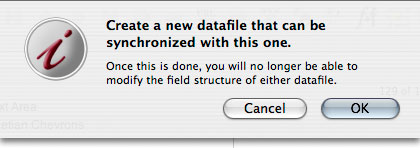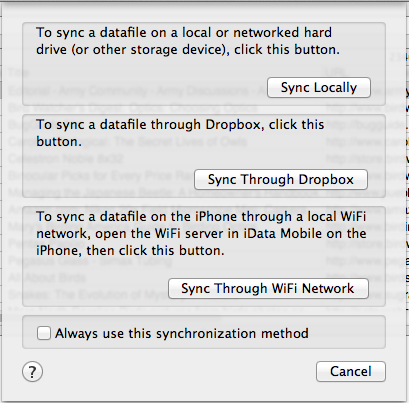via Dropbox
iData Pro provides two methods for
synchronizing datafiles on the Mac with datafiles on the iPhone,
iPod Touch, and iPad. (To keep things simple, we will just refer
to the iPhone below.)
|
Things to Avoid When Beginning to
Use Dropbox with iData Pro
|
Creating a New Sync File on Dropbox
A datafile that was created on
the Mac must first be moved to the iPhone using the Save
As New Sync File function.
1. Open the datafile to be synced in iData Pro. If this
is a datafile that does not already contain a Sync ID, iData Pro
will assume that you want to create a sync file to match it.
NOTE:
Memory is extremely limited on the iPhone. We strongly recommend
that you do not try to use datafiles any larger than 5 MB in
size. If you start to create a sync file that is larger that 5
MB, you will see a warning notice, and will have a chance to
cancel the process. Then you can try to reduce the size of the
datafile. iData Pro provides a function to split a datafile into
two smaller datafiles, but if you are creating datafiles from
scratch, you are probably better off just being careful not to
exceed this file size.
2.
Choose
Create A New Sync File... from the File menu, read the text in the
dialog sheet that comes up, and click the OK button.

3. Next you will be asked how you want to create the sync file. When the following dialog appears, click the Sync Through Dropbox button. When the following dialog appears, you can enable the Always use this synchronization method checkbox to avoid this dialog in the future. (This option can be changed at any time in the Special tab of the iData Pro Preferences dialog.)

4. At this point, a "Synchronizing" progress sheet will open at the top of the datafile window. When the sheet closes, your datafile will appear in the iData folder within the Apps folder in Dropbox.
NOTE: The first time you do this, the Dropbox sign-in page will open in your Internet browser, and you will be asked to sign in to Dropbox. Then the following dialog will come up:

Click the Allow button and the following dialog will come up:

Click the Allow button in this dialog and iData Pro will come back to the front.
Synchronizing a Pair of Sync Files via Dropbox
When synchronizing a datafile stored on Dropbox, iData Pro and iData Mobile Plus perform different roles. If it is to be successful, careful coordination between the Mac user and the iPhone user is required.
The workflow is as follows:
1. The iData Mobile Plus user must save the datafile to Dropbox.
2. The iData Pro user then synchronizes the Mac version of the datafile to the one on Dropbox.
3. Finally, the iData Mobile Plus user downloads the synchronized version of the datafile from Dropbox.
Here are the steps involved.
1. If the iData Mobile Plus version of the datafile has been changed since the last sync, save it to Dropbox. See the iData Mobile Plus User Guide for instructions.
2. Open the Mac version of the datafile in iData Pro.
Note: If the current (frontmost) datafile does not have a Sync ID, then both the Synchronize Datafiles... and Remove Sync ID... items under the File menu will be disabled.
3. Choose Synchronize Datafiles... from the File menu. When the following dialog appears, click the Sync Through Dropbox button.

4. At this point, a "Downloading" progress sheet will open at the top of the datafile window. The message will briefly change to "Synchronizing". If there are no cases of the same record having been modified in both datafiles, the message will then change to "Uploading". When the sheet closes, the datafile on the Mac and the one in Dropbox will be identical.
5. Once the synchronization process has been completed, the iData Mobile Plus user must read the modified datafile from Dropbox. See the iData Mobile Plus User Guide for instructions.